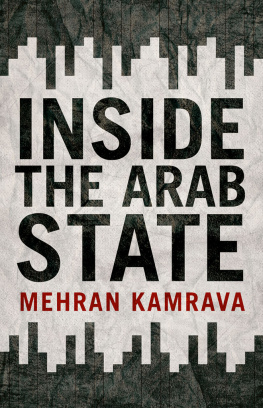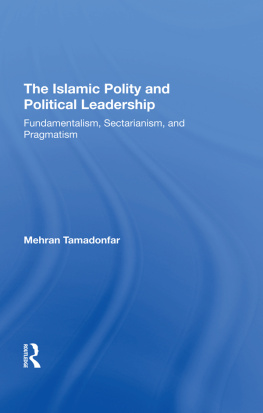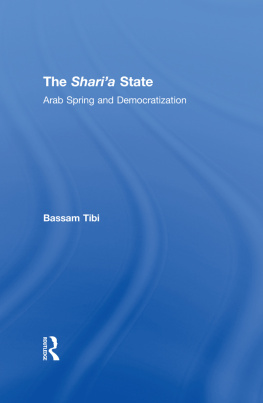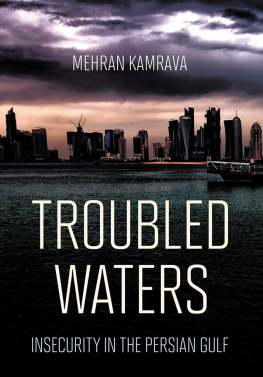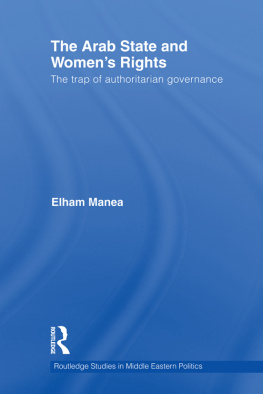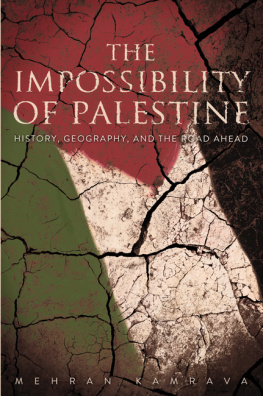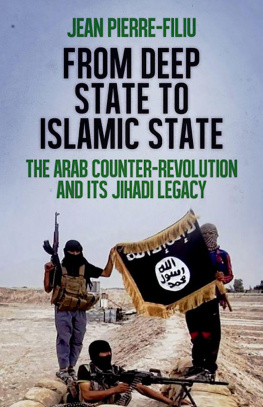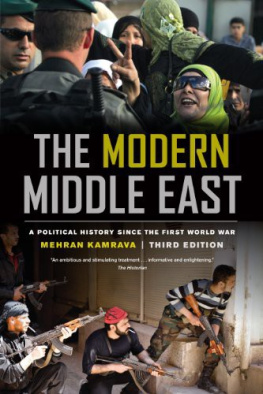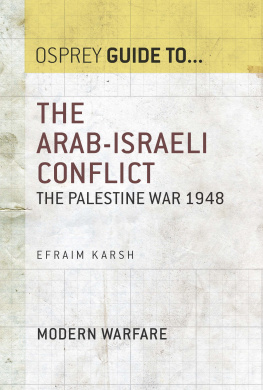Kamrava Mehran - Inside the Arab State
Here you can read online Kamrava Mehran - Inside the Arab State full text of the book (entire story) in english for free. Download pdf and epub, get meaning, cover and reviews about this ebook. year: 2018, publisher: Oxford University Press, Incorporated, genre: Politics. Description of the work, (preface) as well as reviews are available. Best literature library LitArk.com created for fans of good reading and offers a wide selection of genres:
Romance novel
Science fiction
Adventure
Detective
Science
History
Home and family
Prose
Art
Politics
Computer
Non-fiction
Religion
Business
Children
Humor
Choose a favorite category and find really read worthwhile books. Enjoy immersion in the world of imagination, feel the emotions of the characters or learn something new for yourself, make an fascinating discovery.
- Book:Inside the Arab State
- Author:
- Publisher:Oxford University Press, Incorporated
- Genre:
- Year:2018
- Rating:3 / 5
- Favourites:Add to favourites
- Your mark:
- 60
- 1
- 2
- 3
- 4
- 5
Inside the Arab State: summary, description and annotation
We offer to read an annotation, description, summary or preface (depends on what the author of the book "Inside the Arab State" wrote himself). If you haven't found the necessary information about the book — write in the comments, we will try to find it.
Inside the Arab State — read online for free the complete book (whole text) full work
Below is the text of the book, divided by pages. System saving the place of the last page read, allows you to conveniently read the book "Inside the Arab State" online for free, without having to search again every time where you left off. Put a bookmark, and you can go to the page where you finished reading at any time.
Font size:
Interval:
Bookmark:




Oxford University Press is a department of the University of Oxford. It furthers the Universitys objective of excellence in research, scholarship, and education by publishing worldwide. Oxford is a registered trade mark of Oxford University Press in the UK and certain other countries.
Published in the United States of America by Oxford University Press 198 Madison Avenue, New York, NY 10016, United States of America.
Mehran Kamrava, 2018
All rights reserved. No part of this publication may be reproduced, stored in a retrieval system, or transmitted, in any form or by any means, without the prior permission in writing of Oxford University Press, or as expressly permitted by law, by license, or under terms agreed with the appropriate reproduction rights organization. Inquiries concerning reproduction outside the scope of the above should be sent to the Rights Department, Oxford University Press, at the address above.
You must not circulate this work in any other form and you must impose this same condition on any acquirer.
Library of Congress Cataloging-in-Publication Data
Names: Mehran Kamrava., author.
Title: Inside the Arab State / Mehran Kamrava.
Description: Oxford [UK]; New York: Oxford University Press, [2018]
ISBN 9780190876043 (print)
ISBN 9780190934699 (updf)
ISBN 9780190934910 (epub)
This book grew out of a research initiative I undertook under the auspices of the Center for International and Regional Studies (CIRS) at Georgetown University in Qatar. As one of the first steps in the research, CIRS held a two-day brainstorming session in which a number of renowned scholars of the Arab world shared their ideas on the overall direction this volume should take and the questions it should ask and answer. I am deeply grateful to my colleagues at CIRS for organizing the working group, and to the working group participantsFateh Azzam, Michaelle Browers, Juan Cole, Stephanie Cronin, Ahmad Dallal, Steven Heydemann, Michael Hudson, Rami Khouri, Beverley Milton-Edwards, and Adham Saoulifor so generously sharing their thoughts and ideas of what I should explore in this volume.
Thanks to the efforts of Abdelaziz Sebaa, the Algerian Ambassador to Qatar, a number of colleagues in Algeria met and shared with me their insights and perspectives on developments in the country. They included Zouaoui Benhamadi, Liess Boukra, Farouk Ksentini, Abdellaoui Laid, and Amina Mesdoua. I am grateful for their kindness and the generosity of their spirit.
Mohammad Almasri patiently explained to me the methodology used by the Arab Center for Research and Policy Studies in collecting annual public opinion surveys in twelve Arab countries. I have relied on this data extensively in , which explains the methodology used in the annual survey, was kindly provided to me by Mohammad.
At different stages of working on the book, I was assisted by a number of superb research assistants, including Mohammad Abu Hawash, Noof Al-Thani, Safa Babikir, Emma Mogensen, and Erika Thao Nguyen.
Once an initial draft of the book was completed, I had the good fortune of having a second brainstorming session, this time to have the different chapters read and reviewed by another distinguished group of colleagues and friends. They included Osama Abi-Mershed, Zahra Babar, Daniel Brumberg, Steven Cook, Kristin Diwan, Daniel Esser, Desha Girod, Islam Hassan, Suzi Mirgani, Irfan Nooruddin and Marina Ottaway. I feel extremely fortunate and honored to have had early feedback on my writing from such an esteemed group of scholars. The book no doubt still contains many shortcomings. But I am convinced that it is much improved from its earlier drafts because of their feedback.
Grateful acknowledgment also goes to the Qatar Foundation for its support of research and other scholarly endeavors.
Finally, my colleagues at CIRS, where the project was conceived and completed, were instrumental in helping to create a most supportive and intellectually stimulating environment in which to write the book. Their support and assistance, as with everything else I have written since 2007, is most deeply appreciated.
The world watched with eager anticipation as old autocrats collapsed one after another across the Arab world in the early weeks and months of 2011. Dictators whose grip on power seemed firm and unshakable not long ago, and entire regimes well-entrenched and considered powerful, were either pulled down by the power of public protests or were shaken to their core. It was generally assumed that age-old vestiges of authoritarianism would soon collapse. Old, familiar namesBen Ali, Mubarak, Qaddafi, Salehsoon became synonymous with deposed dictators. Domestic Arab politics, often perceived as stale and immobile, or downright dangerous and brutal, suddenly became exciting, hopeful, filled with possibilities.
But this was not to be. At least not yet. What was optimistically called the Arab Spring, the start of a new era, turned out to be, in Steven Cooks words, a false dawn. Before long, politics had become business as usual. For many of the less fortunate Arabs, politics as usual would actually have been a blessing as their countries descended into the abyss of civil war and chaos. Overnight, countless middle-class Iraqis, Libyans, Syrians, and Yemenis were turned into homeless refugees.
This book traces the fateful odyssey of domestic Arab politics starting in the early 1950s, when most modern institutions of the state were established, up until today. The account presented here is only loosely chronological. The periods lasting up until 2011, the challenges to states that fateful year, and the responses of the states to these challenges are each examined in separate chapters. But they are presented here less as a narrative and more through the analytical lens of statesociety interactions, highlighting the importance of the causes, processes, and consequences of the nexus between, and the contests among, states and societies in each period.
The essence of politics boils down to statesociety relations. But these relations are far from mechanical. There are cultural, ideological, and normative dimensions to the interactions as well, and such factors as legitimacy and citizenship are also instrumental in shaping politics. The issues of citizenship, legitimacy, and political Islam, especially after 2011, are also examined here.
To say that 2011 has thrown the Arab worlds regional and domestic orders into turmoil is only to state the obvious. In the aftermath of the Arab Spring, the established order in the Middle East partially collapsed. In the new reality that emerged, state and non-state entities intermingled, and at times the tension between the two redefined Arab politics and geography. In this book, I have placed the state at the center of political analysis, critically examining it in relation to society in general and social actors and social dynamics in particular.
This is a book about statesociety relations in the Arab world, focusing on the institutional makeup and composition of Arab states and how they have sought to establish coercive and ideological apparatuses enabling them to rule over society. Through the lens of historical institutionalism, I maintain that critical junctures provide a window of opportunity for state leaders to craft institutions and institutional arrangements that enable them to rule over society. Once these institutional arrangements are in place, two sets of dynamics begin to occur. At one level, as institutions mature, and as their operations become routine, they begin to develop lives of their own. Slowly, they assume internal dynamics that move them in one direction or another. The actors who created these institutions, however, may not always approve of the direction in which they are moving. Thus, a potential area of tension develops between agency and structurewhat state actors wish to see of the institutions of the state and how these institutions actually behave.
Font size:
Interval:
Bookmark:
Similar books «Inside the Arab State»
Look at similar books to Inside the Arab State. We have selected literature similar in name and meaning in the hope of providing readers with more options to find new, interesting, not yet read works.
Discussion, reviews of the book Inside the Arab State and just readers' own opinions. Leave your comments, write what you think about the work, its meaning or the main characters. Specify what exactly you liked and what you didn't like, and why you think so.

